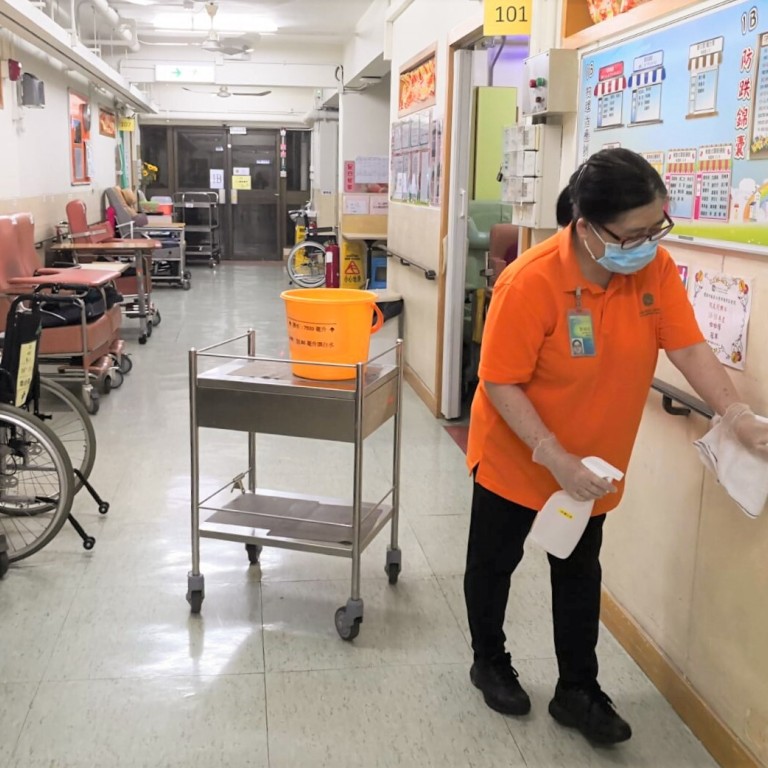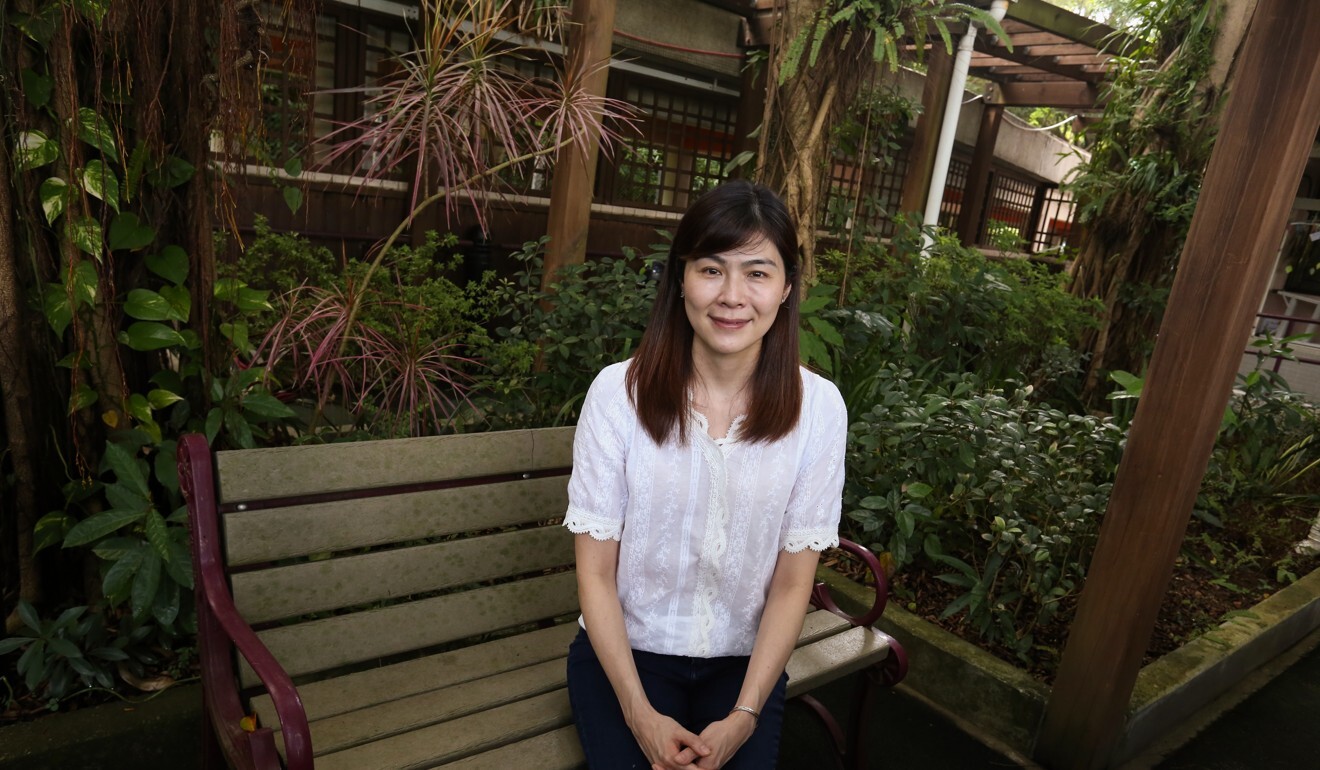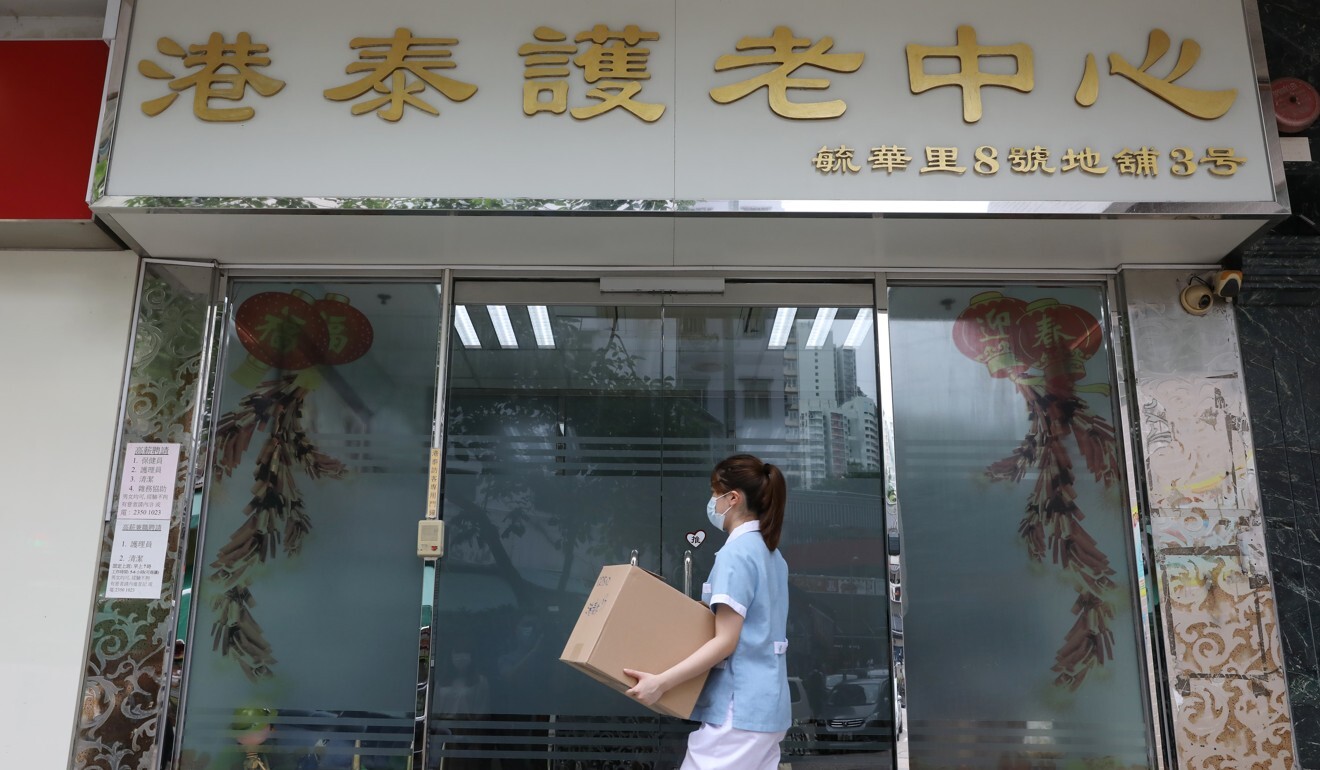
Hong Kong third wave: jolted by outbreak at home for the elderly, care workers tighten precautions
- After keeping Covid-19 at bay for months, care homes act to ensure safety of staff, residents
- Facility staff worry about being infected themselves, guard against bringing coronavirus into the workplace
Tending to the frail, elderly residents at the care home where she works, Lai Sui-lin feeds and bathes them, turns them in their beds, and changes their diapers.
She helps take care of 49 residents, most in their 80s and 90s, at the SAGE Bradbury Home for the Elderly in Aberdeen. Amid the new reality of the coronavirus, she has to check their temperature and disinfect their rooms every four hours, compared to just once a day previously. She also looks out for anyone with new symptoms.
The increased workload has left her tired, but she says the mental stress from the fear of infection makes it more challenging.
“I’m worried, and my family is worried, too. But as a service provider, I can’t stay away just because I’m scared,” she says. “I don’t know when this pandemic will be over, and I’m afraid that one day I may not be able to take it any more.”
If frontline care workers like Lai are anxious, it is because Hong Kong’s Covid-19 crisis has taken a turn for the worse, with a surge in new cases and an outbreak at the Kong Tai Care for the Aged Centre in Tsz Wan Shan, which left two people dead and more than 40 infected, including staff.
I’m worried, and my family is worried, too. But as a service provider, I can’t stay away just because I’m scared
The city’s care homes succeeded in keeping Covid-19 at bay until July 7, when an 85-year-old woman at the centre was confirmed to be infected. The outbreak there coincided with a third wave of coronavirus infections and a tightening of social distancing and other prevention measures.
Hong Kong now has more than 1,700 confirmed cases and 11 deaths, with a worrying rise in infections over the past fortnight.
There are about 74,500 elderly people living in approximately 750 care homes in Hong Kong. The elderly have proven to be among the most vulnerable in the pandemic worldwide.
Geriatric specialist Dr Kong Tak-kwan says that aside from elderly residents, their carers are also an at-risk group, because they may get infected from close contact with those they care for, or bring the virus from outside into the homes.
“Like medical staff in hospitals, staff in care homes also face the risk of coming into contact with potential Covid-19 cases, either known or unknown,” he says. “That is why they need to take precautions.”
Kenneth Chan Chi-yuk, chairman of The Elderly Services Association of Hong Kong (TESA), which has more than 400 members serving about 50,000 elderly care home residents, says these workers have faced tremendous pressure during the pandemic.
“The nature of their work does not allow them to work from home, and they are worried not only about getting infected themselves, but also infecting the elderly in their care,” he says.

Increased workload, mental stress take toll
Nurse Bonnie Li Pui-min, 45, takes care of elderly patients with dementia in a residential care home run by the Jockey Club Centre for Positive Ageing (JCCPA) in Sha Tin. She bathes them, changes their diapers and organises activities for them, including physical exercise and games.
She says she and her colleagues have to remind residents repeatedly to wear their masks, and look out for any signs of unease, as these elderly often have difficulty expressing themselves.
When a resident returns from a hospital visit, Li dons protective clothes before helping bathe the person thoroughly. Afterwards, she has to disinfect the shower room.
Coronavirus: guidelines to keep Hong Kong elderly care homes free of disease must be made mandatory, experts say
The suspension of visits by family members to lower the infection risks has disrupted the residents’ daily routine, with some becoming anxious and repeatedly asking for their family members. Some refuse to eat, and Li says she sometimes has to spend more than an hour coaxing a resident to finish a meal.
She can see that some are affected by the changes brought on by Covid-19.
“A resident in his 70s with mild dementia follows the news about the pandemic closely. He keeps his mask on even when eating, only lowering it when the food reaches his mouth, and putting it back on immediately after,” she says.
“Everyone is stressed in this difficult time. So we take extra efforts to soothe them and make them feel better.”
Adding to the workload is the need to stay updated on the latest guidelines from the health authorities and making constant adjustments at work.
“No one has experienced a pandemic like this. It is a challenge for us all,” she says.
Leung Chu-hei, head of service at JCCPA, says the recent outbreak at the Kong Tai care home has prompted his staff to take stricter protective measures to keep themselves and residents safe.
Seeing the outbreak at another care home left his staff feeling under even greater pressure, he says.
The home now monitors everyone’s temperature, and all visitors must fill out a health declaration form before entering the premises. Residents and those who use the JCCPA’s day care centre are not allowed to share facilities. Cleaning and disinfecting is done more frequently.
Hong Kong third wave: fresh care home cluster feared as city ‘records dozens more Covid-19 cases’
Since last week, the home has suspended all visits and stopped residents from going out, Leung says.
All these anti-pandemic measures have meant more work for staff, he explains, adding the home has provided sufficient protective gear and clear guidelines for staff to stay safe at work.
Clive Chan Kwok-on, service director of the Hong Kong Society for the Aged, which runs nine care homes with more than 1,200 residents, says its 680 staff members have had more work maintaining residents’ personal hygiene, keeping the facilities clean and disinfected, and helping residents keep up their spirits despite the disruptions.
From this week, all staff entering the homes have to clean their hands properly in front of a colleague, change into work suits or clean clothes, and wear a fresh mask.
Chan says some worried staffers living in Sha Tin, where there have been growing clusters of infection, have asked for leave to self-quarantine at home.

Manpower shortage stretches elderly services
Experts say Hong Kong’s care homes initially succeeded in preventing the spread of Covid-19 because of strict infectious disease control measures put in place by the government.
The Centre for Health Protection issued its first coronavirus prevention guidelines on residential care homes for the elderly or persons with disabilities on January 21.
The guidelines were updated on July 8 following the outbreak at the Kong Tai care home, which was suspected of violating government advice by sharing staff with another facility. The tightened measures include avoiding deploying staff to different homes, and banning residents from going out unless necessary.
TESA’s Chan says the homes should continue to reduce elderly residents’ hospital visits, and the hospital authorities should improve testing of elderly patients before discharging them.
He says the pandemic has exposed the serious lack of manpower in elderly care homes, and the need to attract younger, trained people to join the sector.
“The shortage of manpower directly affects the quality of services, especially during the pandemic, when care homes for the elderly are high-risk places,” he says.
The resurgence of cases in Hong Kong also shows that people let their guard down as the pandemic dragged on for months.
People have become exhausted from intensive stress for a long time and succumbed to ‘anti-pandemic fatigue’. That has caused the public to become less alert
“People have become exhausted from intensive stress for a long time and succumbed to ‘anti-pandemic fatigue’,” he says. “That has caused the public to become less alert and take a more relaxed attitude to restrictions.”
Care home worker Lai agrees it feels like the pandemic has gone on too long, compared to 2003’s severe acute respiratory syndrome (Sars) outbreak when she was also looking after the elderly. All she can do, she says, is to stay alert and take protective measures to ensure she and the elderly residents she cares for are safe.
On the days when she feels stressed, Lai says, she goes home and makes sure to rest so she will be good to go again the next morning.
“I do this for the elderly in my care,” she says.

